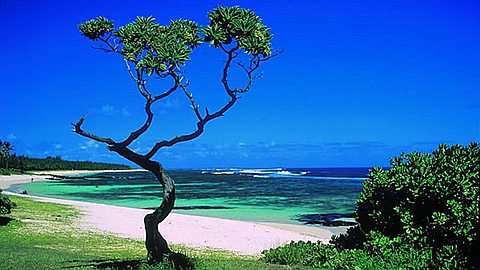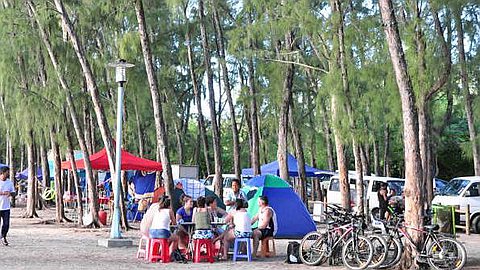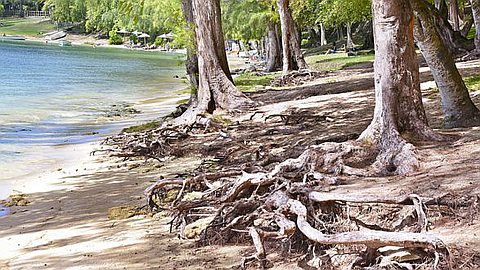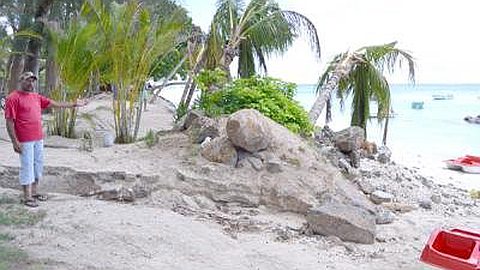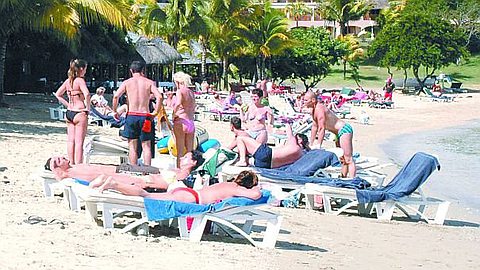Access to Public Beaches: Obstructs the Misunderstanding ...
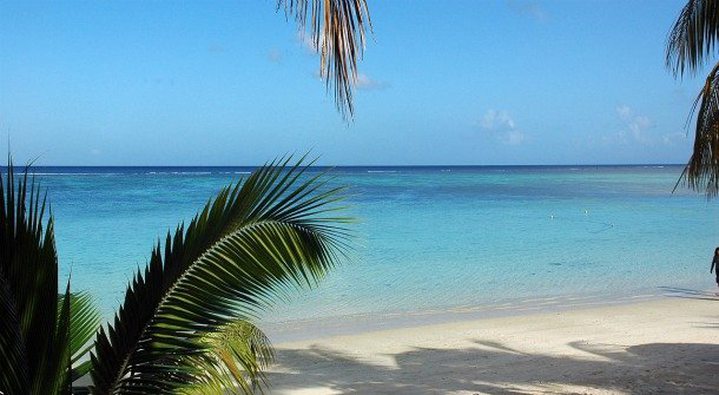
This debate is back in the news in recent weeks with the panels installed by the direction of the Trou-aux-Biches (TAB) Hotel on the beach there is little to prevent the public from encroaching on his property, which happens more more often with the growing number of people attending the nearby public beaches. This extends to other hotels, and more to the camps that first tolerant, are now forced to call a stop against the extension of growing encroachment on their private space. The public, who go to the beach is one of the few hobbies that can afford no longer know which way to turn as space on public beaches shrinks with the arrival of new hotels, and since some time, another phenomenon: the invasion of public beaches by private activities such as chairs that further restrict the limited space can enjoy the picnickers.
It is a fact today to find a place on the public beach is an obstacle course. Especially in the summer when the heat in full swing, many families go to the coast to relax. Overcrowded public beaches, which were reduced by multiplying the hotel park, because people settle where they find a space. A situation leading to an increasing flux of members of the public to the hotels and around the camps where the beach without being private, not public. In doing so, they are accused of infringing on the No geometric. A situation that bothers hotel owners, but also those of bungalows on the coast, who deplore this unceremonious some members of the public, especially tourists, who leave the hotels to apartments, pushing up to sit in the private part of these bungalows.
Some hoteliers, tired of having many conflicts with members of the public, even had to install, as did the TAB Hotel, explanatory panels on the beach, to the picnickers away one day. In so doing, this hotel has attracted the ire of some members of the public who feel that the beach is for everyone. Many people get to the plate and to denounce what they consider to be "an abuse of the hotel." "Today, to be on the beach, you have to elbow. If there is an empty space, you keep it," said one picnicker we met on the beach TAB. "Kan Anvi out or ek or family, enjoy INPE laplaz with or bann pross Pena Assize louse up," say other Mauritians who have experienced the same boat. And argued that "new pa pe dan Lotel returns, lor laplaz new, new in new law."
However, for hoteliers and owners of camps, the situation becomes intolerable. Malenn Oodiah, communications director of the Beachcomber group, which includes the TAB Hotel, emphasized that "the public, whether resident or non-resident moves Slip on our land when it is private land. This is not correct. should say stop. " Where panels have been installed for a few weeks on both sides of the beach TAB, says he.
"People have an interpretation of public beach which is theirs. Yet in our contract for the lease, the Act No geometry is very clear. We are in our right with the installation of the panels," explains Malenn Oodiah. He added that hoteliers and owners of bungalows pay a fortune to the government as well as lease of Camp Site Tax. The installation of the panels on the beach by Hotel TAB was done in consultation and cooperation with the authorities, including the Beach Authority (BA) indicates the communication director of Beachcomber, indicating that these panels are "on the beach of course, but on the grounds of Hotel TAB ".
Ignorance of the law
According to observers, this is a misunderstanding of the law governing the geometric Not causing more conflict not only between the owners of bungalows and picnickers, but hoteliers and tourists. Especially since even if it is a fact that Mauritians no longer have a lot of space on the beach, the beach was stormed by the construction of hotels - with the most beautiful beaches awarded to hotels that proliferate on the coast, and whose saturation is deplored by the hoteliers themselves - we must still go to the evidence of abuse on the part of picnickers squat and even court floors unfenced camps in the absence of the owners, if not the nose and beard even these, or turf forming the front of the hotels. Another proven fact, the transformation of beaches lease car or public playground at the expense of users who can not enjoy simple pleasures like sunbathing to rest in the shade of an umbrella while waiting to dip.
If hoteliers and owners of bungalows are reluctant to settle those "without embarrassment" in front of their property, it is not without reason. "They are at home," said Subash Seeruttun, General Manager of the BA. This is also the right enjoyed by owners of hotels and bungalows which casts doubt on what is "private beaches" in Mauritius. However, if the name of "public beaches" suggests that there is the "private beaches", this is not the case emphasizes the BA. In BA, there are more than 107 beaches (95 in Mauritius), proclaimed public around Mauritius and Rodrigues. These beaches are managed (toilets, water points, tables, grill corners), cleaned and their use is regulated for picnics, camping or grilling. Management and back to BA.
If the State does not recognize private beach, it should be noted that the land on the coast, known as No Geometric are mostly public domain, that is to say, they belong to the State and are leased to individuals or groups. The right to use and returns to the contract holders and access on the leased land is prohibited, says an expert. Hence the insistence of some hotels and bungalows owners to enforce their rights by prohibiting picnickers to settle on their "beach."
Indeed, as noted by the TAB Hotel as Geometric Act No, it is strictly forbidden to the public to settle or stop on a space No part of Geometric and where lease holders have the exclusive right occupation. The part that is not leased is it accessible to all. Commonly called high water mark, this part is between the high tide mark on the beach and extends to the sea "That people move quietly on the beach in front of the camps is often tolerated by some owners camps who understand that sometimes the public beaches are crowded. By cons, what is unacceptable is that one day these squatters park their car (motorcycles, cars, vans, etc..) on the beach in front of the camp or come squarely in the innermost part of the camp, "said the owner of a bungalow adds:" When asked nicely to leave their vehicles elsewhere or not to play ball on the beach, some attack you and insult you. And you forced to call the police. This is often the case on Sundays or during school holidays. "
Beach Authority "Mauritians are very aware of the limitations ..."
This fluctuation of the boundary with respect to fish and seafood also often conflicts between hoteliers, who point out that tourists who rent their service at least expect not to be disturbed while on the beach in front of the hotel. And to emphasize that it is not clear whether or not it infringes on private property. To the General Manager of the BA, this question does not even arise: "Mauritians are very aware of what they are entitled to or not." He added that these owners camps and hotels that are signs prohibiting or explanation are perfectly within their rights to prohibit the public to settle there. "We need to get into the skin of a hotel or a bungalow owner. Forget the beach, and you say that in your yard, no one has the right to enter without permission. By cons, everyone has the right to be in the street in front of you as long as it is not installed in your backyard, "said Subash Seeruttun. Ditto for hotels and bungalows, he said. "You can move between the sea and the high-water mark. Highest is the area of ??the hotel or camp."
Mauritians understand this situation, but the problem remains. "Where should we go? Beaches are saturated. There is more space. Hotels have taken everything. And today it is released in our country," they say. "Pé pushes new power dan new tourist kapav own country enjoy," they add.
Paradoxically taste for leisure beach has grown for Mauritians, plus the space reserved for them, that is to say, public beaches, narrowed, especially on the part of the island where the coastline is the most popular. Indeed, with the proliferation of hotels by the sea, the Mauritian population has been dangerously narrow the scope of public beaches which it has access. "If we understand that tourists seeking tranquility in hotels, the authorities must also understand that we must have the right to peace on our beaches," say the Mauritians deplored today that we must play elbows a little space on the most popular public beaches. Some prefer to peace of mind, even if they are less beautiful and are located in more remote areas, go to public beaches that are marginal is less satisfied.
As for tourists backpacks, those who have left for hotels apartments or houses in the informal sector are mostly behind the coastal settlements, they often squat Geometric No hotels or camps with a slip- which surprised even their compatriots in the formal sector. They also claim, on behalf of those convinced they rent their homes, beach parties that are not public!
Chairs: private business on public beach
There has also recently increased development of small private business on the public beach. With spearheading the sun which now invaded the majority of the most beautiful public beaches of the island. Especially instead keep beach chairs stacked operators appropriated large areas on the beach, frustrating picnickers who just want to settle with their simple towel. This trade is singled out by members of the public, highlighting the laxity, if not the complicity of the authorities, against this growing phenomenon despite existing regulations. To justify the licenses that were recently allocated, while the board of BA has recently decided that trade chairs would occupy only 15% of the area of ??a beach and no new license would be allocated Subash Seeruttun says that the new operators that do not fill the spaces operated within the limits of 15%. An explanation unconvincing at a time when the problem of availability of beach for Mauritians is also critical. A situation which is, in any case, far from pleasing to the public deplores "the permits primarily boyfriends" and protests of the other type of abuse to which the authorities turn a blind eye.
In any case, in times of great pressure on the coast, the conflict increases dangerously. It is therefore urgent to find more sustainable solutions to the many Mauritians who hear rightly go relax by the sea to relieve the stress accumulated during the week at work where school. And that respecting the right of legal occupants of the coast of Mauritius. Whole program to remove sand growing incomprehension that animates the meeting place between land and sea.
Need explanatory panels
Park your car on the beach or playing ball can result in a fine of Rs 10,000 or imprisonment not exceeding one year
If the existing law, in this case the Beach Authority Act and no geometric Act is clear that it is of what we can or can not do on a beach, is the common Mauritians and foreigners who enjoy the beaches, do not know the ins and outs. Even the police or coastguard often unaware. In the absence of information from the authorities, signposts and especially against the laxity of the authorities to crack down, residents and visitors to a day or more often ignored. How many are those who know that it is forbidden, for example, to play ball on the sand? And that it is committing an offense to park a vehicle on the beach? These non-compliances of the law are liable to a fine of Rs 10,000 and imprisonment not exceeding one year.
If the BA believes that we "always dimoun koné ki lor laplaz kapav iron", many observers believe that the panels would be useful in more ways than one. As is the case for example on beaches abroad where it is explicitly stated that is prohibited or permitted. The list is not exhaustive, is indicated through signs, like those of traffic on different areas or paths to these beaches.
Some believe that Maurice should follow this example to avoid tensions increasingly on our public beaches and not geometric. In this statement, the Director of the Beach Authority, Subash Seeruttun, replied that "we are a country for tourism. We will not spoil our beaches with signs everywhere." He points out that in terms of improvements made by the BA, as parking spaces and room hygiene, there are indeed signs. "This is our responsibility. But on the beaches, it is not for us to do," he said. Who then would this work? "The police must do their job and warn people when they go against the rules. And if necessary, it should crack," said the General Manager of the BA.
Limited vision which suggests a lack of political will to resolve conflicts between hoteliers, owners of bungalows and public is growing these days, so a bridge hotel has had to put himself panels explanation to the public.
According to oceanographer Vassen Kauppaymuthoo: "The beaches do not belong and can not belong to anyone"
Weekend interviewed by the perpetual conflict between hoteliers and members of the public on the accessibility of public beaches, oceanographer Vassen Kauppaymuthoo emphasized that "the beaches do not belong and can not belong to anyone," Citing Article 538 of the Civil Code, it shows that the beaches and sea are part of the sacrosanct public domain which is, according to the law and inalienable. "This means that the beaches (between the sea and the high water mark) do not belong and can not belong to anyone, not even the State, and that no one can or should be appropriated. And even if c 'were, they could never be prescribed, "said Vassen Kauppaymuthoo.
Although the beaches and the sea under public law, it is a fact, says our interlocutor that "all that is above the high water marks, not ours." "It is not often Geometric who were hired by the State to individuals or hotels," he said, noting that "nobody has the right to enter the property without the consent of the tenant or the State. " In cases where owners camps are members of the public get into the space above the high water-mark and settle there or on their terrace or around their pool, the rule of law must prevail and people , he adds.
Where is the high-water mark?
The high watermark is where the sea stops at the highest level it reached during high spring tides called spring tides. Everything below this line high spring tides is part of the public domain and nobody can take ownership.
The oceanographer said that this part of the beach that is in the public domain should not be obstructed in any way. "The Criminal Code Supplementary moreover provides a criminal conviction, a fine and imprisonment for any person or entity that prevents, blocks or obstructs the passage of the public domain, therefore public beaches and the sea," said it. Thus, according to him, this area must remain free, and it is the police and the Coast Guard to enforce the law and ensure that it is respected. "In theory, it should be treated as criminal any person, organization or company that obstructs the passage of public beaches and in the sea"
Not always respected
However, the reality is quite different, our interlocutor stressed, noting that even if - through various denunciations in the press and civil society, as well as defenders of ecology - the population begins to understand his rights in the public domain, including the sea and the beaches, and the claims that more rightly illegally when appropriate. And cite the case of Ilot Gabriel, leased and which required a checkbox Court that the public can have access to the beach part of the island. "We had to appeal to the Supreme Court to restore the public's right. Everybody does not have the means to call, unfortunately," he said. For the oceanographer, given all that has happened, the authorities should have to regroup and patrols on beaches and remove obstructions. "The sea and the beaches belong to us, we must defend it," he said.
Restore order in this case
For the oceanographer, it is essential to restore order in this case. "That would mean it would restore public beaches in Mauritius to prevent any private person or business will not install on these places that have become havens of peace and tranquility," he said. It should also, according to him, the police and coast guard protects the rights of citizens to move freely around the island, the beaches below the high spring tides.
The law and the rules by the Beach Authority (use of public Beach) Regulations 2004
What is allowed with conditions
- No boat will be docked on any part of the public beach, except in areas specifically designated for such finexcepté when cyclone warnings were issued.
- No dog or other pet is allowed on the public beach unless it is kept on a leash of less than 2 meters and such a force that could prevent the animal from releasing the leash.
- No person shall drive a horse for the purpose of training or recreation, unless he holds a permit from the Authority.
- No person shall erect or place a building or display or to display a document on a public beach, it is not holding a written authorization from the Authority.
- It is forbidden to enter the sea waters of a public beach with a boat, except along a passage which such passage is defined by the Authority.
What is forbidden
- Drive, ride or park a vehicle (car, van, truck, 4x4 etc ...) including motorcycles, mopeds and bicycles on the public beach
- Play football or volleyball on the public beach (except in areas that may be designated for that purpose by the Authority)
- Damaged or interfere with any flora, including trees and grasses on a public beach;
- Remove, deface, damage or destroy any sign or pole placed on a public beach;
- A fire outside a place designated by the Authority;
- Leave a fire unattended in a safe area before the fire is completely extinguished;
- Remove or leave objects, including waste or garbage on the public beach, except in the container or in an area set aside for this purpose;
- The placing or dumping of waste or garbage, oily liquid, acid or other chemical or toxic or polluting the marine environment on a public beach;
- Engage in a game or activity that is likely to cause danger to any person or damage to property
- Abandon ship, motor vehicle or other property on a public beach
That risk offenders:
- An authorized officer or a police officer may at any time issue a notice of violation to a person when he is satisfied that the conditions imposed in the authorization are not respectées. Un notice of contravention must not be an obstacle to a prosecution for an offense in respect of which the notice was served.
- Any person who contravenes règlemnts fails to comply with the conditions of an authorization granted fails to comply with a notice of violation or order made by an authorized officer or a police officer commits an offense and on conviction guilty, is liable to a fine not exceeding 10,000 rupees and to imprisonment not exceeding one year.
